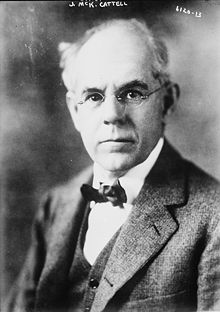James McKeen Cattell
| James McKeen Cattell | |
|---|---|
 |
|
| Born |
May 25, 1860 Easton, Pennsylvania |
| Died | January 20, 1944 (aged 83) Lancaster, Pennsylvania |
| Nationality | American |
| Fields | psychologist, psychometrics |
| Institutions | University of Cambridge, University of Pennsylvania, Columbia University |
| Doctoral advisor | Wilhelm Wundt |
| Doctoral students | Walter Dearborn |
James McKeen Cattell (May 25, 1860 – January 20, 1944), American psychologist, was the first professor of psychology in the United States at the University of Pennsylvania and long-time editor and publisher of scientific journals and publications, most notably the journal Science. He also served on the board of trustees for Science Service, now known as Society for Science & the Public (or SSP), from 1921–1944.
At the beginning of his career, many scientists regarded psychology at best a minor field of study, or at worst a pseudoscience such as phrenology. Perhaps more than any of his contemporaries, Cattell helped establish psychology as a legitimate science, worthy of study at the highest levels of the academy. At the time of his death, The New York Times hailed him as "the dean of American science." Yet Cattell may be best remembered for his uncompromising opposition to American involvement in World War I. His public opposition to the draft led to his dismissal from his position at Columbia University, a move that later led many American universities to establish tenure as a means of protecting unpopular beliefs.
Born in Easton, Pennsylvania in 1860, Cattell grew up the eldest child of a wealthy and prominent family. His father, William Cassady Cattell, a Presbyterian minister, became president of Lafayette College in Easton shortly after James' birth. William Cattell could easily provide for his children, as he had married Elizabeth "Lizzie" McKeen in 1859; together they shared Lizzie's substantial inheritance. To this picture of the family's success one could add political power as well, as James' uncle Alexander Gilmore Cattell represented New Jersey in the United States Senate.
...
Wikipedia
